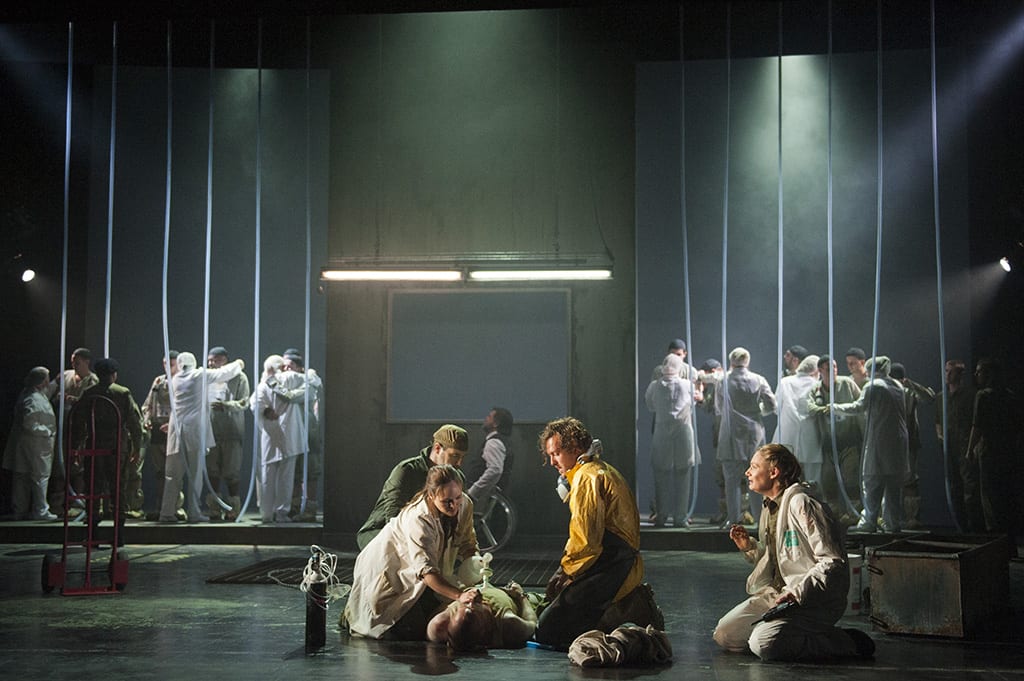This production of Beethoven’s spiritual, hopeful opera Fidelio succeeds on its important musical levels. All the principal singers have fine voices and are well cast. Elizabeth Atherton’s Fidelio is convincing as a tall, rangy boy, moving as a loving wife and seeker after justice; and utterly convincing in her portrayal. Lucy Hall is a lovely Marzelline and the women’s voices blend beautifully. The acting is fine throughout by every member of the cast,with Simon Thorpe’s Don Pizarro being pushed to be a bit too obviously villanous, lecherous and murderous—a kind of exaggerated Don Trump? Adrian Dwyer has a unique timbre of his own but a beautifully tuned instrument and his singing and acting as Florestan was exemplary and moving. Indeed, the whole second act of this production works well, perhaps because by then we have accepted the approach of the production and also because text and music are much more focused on individual emotions and therefore more in the hands of the actual performers. I was particularly impressed by John Paul Huckle’s singing and characterization as Rocco, liked Sam Furness as much as ever, and thought Timothy Dawkins was authoritative as Don Fernando. I enjoyed singing of Simon Thorpe as Don Pizarro and was also very impressed by his ability to manipulate a wheelchair. So you will not be disappointed musically by this production. The orchestra sounded very good under the strong leadership of the talented conductor Gad Kadosh.
But overall I am afraid that I found the approach of diretor Orpha Phelan to Fidelio troubling, uncommunicative and wrong headed. It seemed to me to be at odds with the work itself. I found the way it was updated into a kind of Mad Max movie happening in a dystopian future just didn’t work for me.
I intensely disagreed with the rewriting of the story so that Florestan, a kind of Green activist in what seems to be a world that is emerging from a dictatorship, shoots Don Pizarro during the prologue (enacted with much fussy but unclear detail during the overture) and cripples him, thus giving, in some ways, a justification for Pizzaro’s vengeance that should not be there. Florestan is clean; he is honest and honourable. That is one of the main points! Instead we see him wielding his gun and shooting his enemy before the opera starts.
I assume the prisoners are making cocaine or some other illegal drug and that Pizzaro is using them to build his personal fortune; but that was not entirely clear to me. I also found that doing the dialogue in English while singing in German was awkward and at times jarring. It was also a sneaky way to cut out a lot of the dialogue, which changes the balance of music to speech in what is, after all, a Singspiel. It also was a chance to rewrite dialogue into contemporary slang so that the audience would not have to trouble its head reading surtitles, I guess, or worry about old fashioned language; and so that the story could be tweaked to fit the version that Orpha Phelan was imposing on the material. But in that case why not just translate the whole thing and sing it all in English? I also was very annoyed that among the cuts was the exchange between Florestan and Leonore after she has freed him and while they are still in the dungeon. “My Leonore, what you have done for me!” “It was nothing, nothing, my Florestan!” Then you go into the duet. It may not have been set to music, but that is one of the high points of German art, that moment; and it is not there. Don’t even get me started on Jacquino’s blowing smoke rings during passages in the final scene.
All in all, I felt that as a production this was an example of someone having ideas that they want to impose on a work rather than engaging with the work itself and interpreting what is actually there. Henry James said you had to accept “the given”; and to my mind the director hasn’t understood the actual import of the opera.
I have no objections to updating settings or even retelling the story – Jane Smiley does a fine job of updating King Lear in her novel A Thousand Acres; Jonathan Miller famous used a post World War II mafia setting in the USA for Verdi’s Rigoletto (West Side Rigoletto?) – I could go on and on about updates that actually added something to our understanding and illuminated the original text and its intentions. The problem with this production is that it is simply ugly and feels very much as if the director was not only imposing her ideas willy nilly, but also did not trust the original text or the audience.

